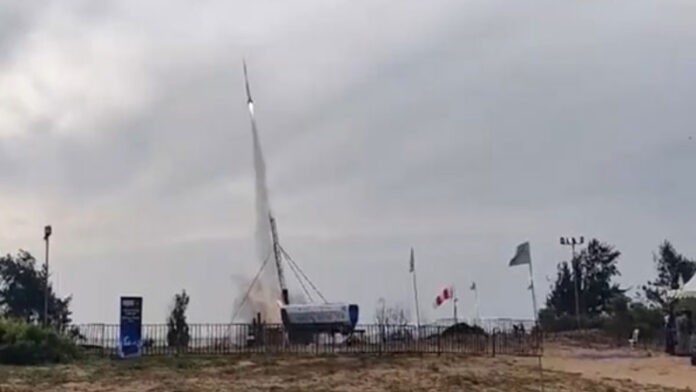In a historic achievement for India’s space technology sector, the country’s first-ever reusable hybrid rocket, named RHUMI-1, was successfully launched on Saturday from Thiruvidandhai near Chennai. The launch marks a significant milestone in India’s efforts to advance its space exploration capabilities and was spearheaded by Tamil Nadu-based startup Space Zone India, in collaboration with Martin Group.
RHUMI-1, carrying three Cube Satellites and 50 PICO Satellites, was launched into a suborbital trajectory using a mobile launcher. The satellites are intended to collect crucial data for research on global warming and climate change. The rocket, which is 100% pyrotechnic-free and contains 0% TNT, employs a generic-fuel-based hybrid motor and an electrically triggered parachute deployer.
The reusable hybrid rocket combines the advantages of both liquid and solid fuel propellant systems, improving efficiency and reducing operational costs. It is designed with a strong focus on flexibility and reusability, incorporating cutting-edge technologies such as an adjustable launch angle, which can be modified between 0 and 120 degrees for precise control over its trajectory. The rocket also features a CO2-triggered parachute system, an environmentally friendly and cost-effective mechanism to ensure the safe recovery of rocket components post-launch.
In addition to its applications in space exploration, RHUMI-1 has the potential for use in agriculture, environmental monitoring, and disaster management. The mission is led by Anand Megalingam, the founder of Space Zone India, under the mentorship of Dr. Mylswamy Annadurai, former Director of ISRO Satellite Centre (ISAC).
Space Zone India, based in Chennai, is an aero-technology company focused on providing low-cost, long-term solutions for the space industry. The company offers hands-on training experiences in aerodynamic principles, satellite technology, drone technology, and rocket technology, aiming to create awareness about career opportunities in the space sector. Space Zone India collaborates with private institutions, engineering and arts colleges, as well as private and government schools, to foster interest and education in aerospace technology.
In 2023, Space Zone India led the ‘Dr. APJ Abdul Kalam Students Satellite Launch – In 2023’ initiative, which saw over 2,500 students from government, tribal, and public schools across India participating in the design and construction of a student satellite launch vehicle. This vehicle was capable of carrying a payload of 150 Pico satellite research experiment cubes.



